
Peace strategist Mohamed Ali speaks at TEDCity2.0, bringing us to the city of Mogadishu. Photo: Ryan Lash
Could unemployment be a factor that leads to terrorism?
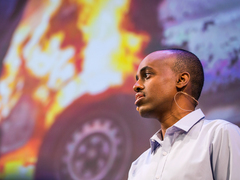 Mohamed Ali: The link between unemployment and terrorism
In today’s talk, peace strategist Mohamed Ali (not to be confused with the boxer) introduces us to the youth of Mogadishu, Somalia — 70 percent of whom are unable to find jobs. In this talk, Ali highlights just how appealing the messages of terrorist organizations and gangs can be to these young people. These groups offer a sense of purpose to those who are waiting for their lives to start.
Mohamed Ali: The link between unemployment and terrorism
In today’s talk, peace strategist Mohamed Ali (not to be confused with the boxer) introduces us to the youth of Mogadishu, Somalia — 70 percent of whom are unable to find jobs. In this talk, Ali highlights just how appealing the messages of terrorist organizations and gangs can be to these young people. These groups offer a sense of purpose to those who are waiting for their lives to start.
But Ali sees a possible antidote: encouraging entrepreneurship, so that young people are empowered to create their own opportunities. In this talk, Ali tells the story of his Youth Leadership and Entrepreneurship Summit in Mogadishu — and the incredible people there who started a motorbike rental company, founded the first florist in Mogadishu, and more.
In this talk, Ali notes a fascinating correlation. Here, more TED Talks that point to the importance of encouraging entrepreneurship.
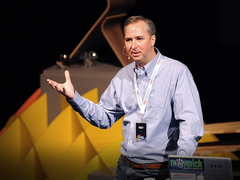 Cameron Herold: Let's raise kids to be entrepreneurs
Cameron Herold: Let’s raise kids to be entrepreneurs
Cameron Herold: Let's raise kids to be entrepreneurs
Cameron Herold: Let’s raise kids to be entrepreneursThere is a group of kids who have trouble paying attention in class and who aren’t amped about after-school activities: kids who might excel at starting businesses. While our education system teaches us to want “a good job,” in this talk, Cameron Herold stresses the importance of encouraging children who might start their own companies to provide good jobs for others. |
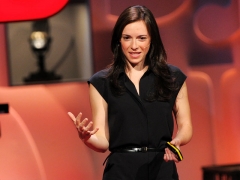 Jessica Jackley: Poverty, money -- and love
Jessica Jackley: Poverty, money — and love
Jessica Jackley: Poverty, money -- and love
Jessica Jackley: Poverty, money — and loveKiva.org offers microloans to people in the developing world to help them start or grow their businesses. In this talk, the founder of the organization shares how she flipped her thinking on charity from being something offered out of a sense of guilt to being an exciting opportunity to work with a person to improve their life, while validating their dignity. By encouraging individuals to grow their business, this type of giving can even raise up entire communities. |
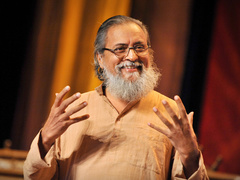 Anil Gupta: India's hidden hotbeds of invention
Anil Gupta: India’s hidden hotbeds of invention
Anil Gupta: India's hidden hotbeds of invention
Anil Gupta: India’s hidden hotbeds of inventionThe developing world is full of inventors with genius ideas for how to solve their community’s unique problems. And we can encourage them, says Anil Gupta. In this talk, Gupta introduces us to the Honey Bee Network, which helps build connections and identities for entrepreneurs in India, so that they can find resources and a market for their ideas. Why the name “Honey Bee?” Because Gupta sees his role as that of a bee, pollinating promising ideas. |
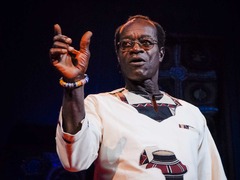 George Ayittey: Africa's cheetahs versus hippos
George Ayittey: On cheetahs vs. hippos
George Ayittey: Africa's cheetahs versus hippos
George Ayittey: On cheetahs vs. hipposThere are, at the moment, two Africas. There is the Africa of the hippos, i.e. the current ruling elite, who are happy with the status quo and who are rattled by corruption. And then there is the Africa of the cheetahs — those moving fast to bring innovation all around the continent. These cheetahs are young entrepreneurs who aren’t willing to wait for the government to do things for them, but who do it for themselves. “Africa’s salvation rests on the backs of these cheetahs,” says Ayittey. |
 Ludwick Marishane: A bath without water
Ludwick Marishane: A bath without water
Ludwick Marishane: A bath without water
Ludwick Marishane: A bath without waterYoung Ludwick Marishane and his friends had an idea—could you bathe without walking miles to get a jug of water? Marishane tells the story of how he researched formulations and wrote an entire business proposal on his mobile phone, and brought DryBath to the market with the needs of his community in mind. His point: those under the age of 18 can be successful entrepreneurs. |
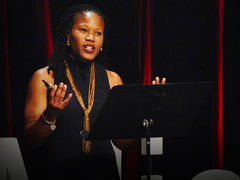 Majora Carter: 3 stories of local eco-entrepreneurship
Majora Carter: 3 stories of local eco-entrepreneurism
Majora Carter: 3 stories of local eco-entrepreneurship
Majora Carter: 3 stories of local eco-entrepreneurismEntrepreneurship can transform the lives of individuals, while also easing the strain on the environment, says Majora Carter. In this talk, Carter introduces us to three people — one in Chicago, one in Los Angeles, and one in West Virginia — who thought up marketable ideas to address the needs of their community. Their business ideas are fascinating — and also remarkably green. |
Comments (41)
Pingback: favorite entrepreneur and ted talk synopsis - bestgradeprofessors.com
Pingback: Favorite Entrepreneur and TED talk synopsis - Essaywritersexpert
Pingback: favorite entrepreneur and ted talk synopsis - Assignments Care
Pingback: Favorite Entrepreneur and TED talk synopsis - Essaypassusa
Pingback: favorite entrepreneur and ted talk synopsis - Assignment Collections
Pingback: Favorite Entrepreneur and TED talk synopsis - Classaider
Pingback: favorite entrepreneur and ted talk synopsis - BlueOrigin EssayWriters
Pingback: favorite entrepreneur and ted talk synopsis - AU savvy Writers
Pingback: Favorite Entrepreneur and TED talk synopsis - Technicalfreelancers
Pingback: favorite entrepreneur and ted talk synopsis - Proficient Writers Hub
Pingback: Favorite Entrepreneur And TED Talk Synopsis » Termpaperpros
Pingback: Encouraging Entrepreneurship | Webbitizers
Pingback: Entrepreneurship
Pingback: Kamloops Innovation | Inspiration: Free